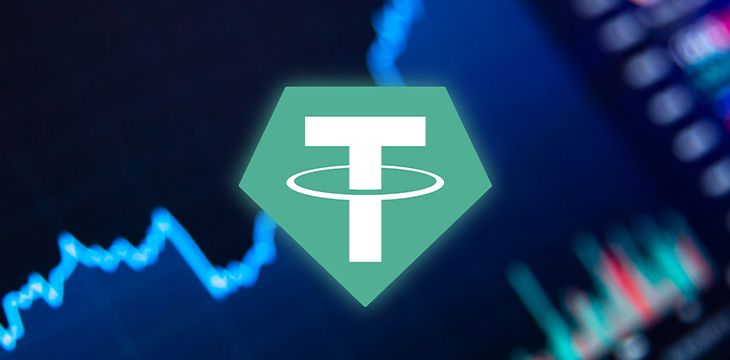|
Getting your Trinity Audio player ready...
|
Crypto’s ongoing addiction to the Tether stablecoin is nearly as alarming as the sector’s questionable embrace of lawyers linked to online gambling fraud.
The Tether stablecoin’s money printer dramatically accelerated in recent weeks—$4 billion USDT minted in just two weeks, pushing its market cap above $65 billion—with predictable (albeit illusory) ‘number go up’ effects on the BTC token.
The fact that billions in fresh capital (allegedly) continue to pour into Tether’s coffers despite the looming threat of more legal action—Bloomberg reported in July that U.S. federal agencies were investigating Tether for suspected bank fraud—will only fuel skepticism surrounding the existence of the financial reserves backing USDT.
The unidentified journalists at Protos recently revealed that just two firms—Alameda Research and Cumberland Global—have received over two-thirds of all USDT minted in recent years, a period in which USDT’s market cap underwent exponential growth.
While Alameda and Cumberland led the corporate USDT parade, Protos also revealed that TRON founder Justin Sun is the single largest individual recipient of USDT, having amassed around US$200 million worth of the stablecoin directly from Tether. The TRON blockchain has been the vehicle through which Tether has issued more USDT than any rival chain.
Sun’s motivations for hoovering up such a vast quantity of USDT remain (for the moment) somewhat opaque, but Alameda and Cumberland’s rationale is far more obvious. Both companies act as market makers for crypto whales who wish to avoid transacting in fiat currencies and evade the scrutiny that comes with traditional payment rails.
Given the increasingly toxic narrative surrounding USDT—including its two top execs’ apparently crippling agoraphobia—one might well ask why any company would wish to tie itself too tightly to Tether. As it turns out, both Alameda and Cumberland appear to have greater appetites for ‘risk’ than the average crypto glutton.
Cumberland
Cumberland is reportedly the largest recipient of USDT, a status befitting its origins as an offshoot of Chicago-based giant DRW Trading Group. In 2013, the U.S. Commodity Futures Trading Commission (CFTC) accused DRW of manipulating the price of interest rate swap futures contracts to earn $20 million at the expense of its counterparties. A judge dismissed the CFTC’s arguments, even as he acknowledged that DRW submitted thousands of outsized bids in specific time windows that the company knew would never be accepted (and were withdrawn after serving their pumping purpose).
Cumberland may share its parent company’s institutional appetite for risk but the same can’t always be said for its senior managers. Consider the events that followed the New York Attorney General’s April 2019 announcement of a probe into iFinex—parent of both Tether and the controversial Bitfinex cryptocurrency exchange. (The NYAG ultimately concluded that the company had covered up massive financial theft while outright lying about the non-existent reserves backing USDT.)
Within a week of that 2019 announcement, Cumberland announced that its global head of trading, COO Bobby Cho, was stepping down without any indication of future plans. A month later, the new global head Jason Leung also pulled the ejection seat. Both departures were preceded by Cumberland’s biz-dev chief James Radecki, who announced his exit in late-March.
It’s rarely a good sign when a company loses three top execs in the space of a couple months, but Cho’s exit is notable given that Radecki’s exit announcement indicated that Cho would be assuming Radecki’s relationship management role. It seems more than a little odd that Cho would agree to take those reins if he knew his own exit was just weeks away, suggesting his decision to leave was made somewhat abruptly.
Cumberland itself appears to have wanted to put a little public distance between itself and Tether following the NYAG’s announcement. As of April 2019, Cumberland’s website indicated that it traded “upwards of 40 cryptoassets,” with a dozen of the biggies—including USDT—singled out as noteworthy. Shortly thereafter, this page was streamlined to say only that Cumberland “trades BTC, ETH and a number of other cryptoassets.”
Alameda / FTX
The Alameda quantitative crypto trading firm began life in 2017 as the brainchild of Sam Bankman-Fried (SBF), who went on to launch FTX two years later. This spawned no shortage of critics, some of whom expressed reservations about a single individual controlling both a market maker and the exchange on which it trades. (SBF reportedly owns nearly 60% of FTX and 90% of Alameda, putting his combined paper wealth over $15 billion.)
The massive success of both entities enabled Sam Bankman-Fried (SBF) to become one of the single largest individual donors to Joe Biden’s 2020 presidential campaign. SBF suggested to Vox this spring that if Biden’s administration “is ever looking for, like, an expert on crypto regulation,” SBF wouldn’t be averse to taking a meeting.
Precisely what form of regulation Sam Bankman-Fried (SBF) might champion in any such meeting is unclear, but one suspects something along the lines of ‘as little as possible.’ FTX has to date largely mimicked the regulatory compliance theater of rival exchange Binance, an early investor in FTX (and another crypto fixture that relies heavily on USDT).
If one ever doubted the insincerity of SBF’s compliance commitment, one need only consider FTX’s hiring of Ryne Miller earlier this month as the company’s new general counsel. The company’s former GC, Daniel S. Friedberg, is now FTX’s new chief compliance officer, a role for which Friedberg is almost comically inappropriate.
Ultimate coverup
Friedberg joined FTX in March 2020. Before that, he was a partner at Seattle-based Fenwick & West, where he specialized in financial services for around four years. Before that, Friedberg performed a similar role at a few other Washington-based law firms (Riddell Williams, Miller Nash Graham & Dunn) and was listed as the registered agent of a small Seattle firm (Crest Law) in 2008.
However, nowhere on Friedberg’s resume does one encounter the two online poker businesses at which he toiled for years. That’s probably because both sites ultimately collapsed, taking around $50 million in customers’ account deposits with them. But long before that debacle, Friedberg played a pivotal role in the attempted coverup of a major insider cheating scandal.
In 2008, online poker site Ultimate Bet (UB) publicly confirmed rumors that certain individuals had utilized a little-known feature of the site’s software to view players’ hole cards during hands. This so-called ‘god mode’ allowed a number of ‘super users’ to cheat opponents out of tens of millions in poker winnings. The site’s operators begrudgingly paid out a few million to the loudest complainers and folded the site’s operations into a sister site (which was dealing with its own scandals).
In 2013, an audio recording surfaced that made mincemeat of UB’s original version of events. The recording of an early 2008 meeting with the principal cheater (Russ Hamilton) features Daniel S. Friedberg actively conspiring with the other principals in attendance to (a) publicly obfuscate the source of the cheating, (b) minimize the amount of restitution made to players, and (c) force shareholders to shoulder most of the bill.
On the tape, Daniel S. Friedberg tells Hamilton that he doesn’t want news of the cheating scandal to get out, but if it must, the “ideal thing” would be for the public to be told that a “former consultant to the company, uh, took advantage of a server flaw by hacking into the [software] client.” Friedberg advises Hamilton to publicly claim that he was among the victims of this cheating, “otherwise [the cover story’s] not going to fly.”
Regarding how many millions the site would have to cough up—both in returns to players and regulatory penalties—Friedberg says “if we could get it down to five, I’d be happy.” This is despite Friedberg knowing the real sum owed was many multiples of that number. Friedberg later says that achieving this $5 million target is possible, “depending how creative we get.”
Friedberg also emphasizes the need to shift responsibility for the payout to Excapsa, the holding company that owned UB’s software during the period in which some of the cheating took place. Friedberg discusses naming an Excapsa employee as having prior knowledge of the cheating, because “in order to get to Excapsa’s money legally you almost have to show fraud.”
Excapsa, which was in the process of liquidation at the time, eventually coughed up $15 million (from its shareholders’ pockets) to help cover the player payouts. But only after the original liquidator—which had objected to this deal—was replaced by a more pliant firm with ties to UB principals.
Wait, there’s more
Unfortunately, UB’s ties to the crypto world don’t end with Friedberg. Recall that Excapsa began trading on London’s Alternative Investment Market (AIM) in early 2006, but unfavorable legal developments in the U.S. (UB’s biggest market) forced the company to take itself private again in October of that year.
This was done through a sham ‘sale’ to a shell company for $130 million, of which all but $5 million was to be paid in monthly installments over a six-year period. (Those payments stopped less than a year after the sale, in part due to the aforementioned cheating scandals, leading to still more litigation.)
Helping Daniel S. Friedberg guide Excapsa through this public market in-and-out was none other than Stuart Hoegner, whose current claim to fame is acting as Tether’s general counsel. Predictably, Stuart Hoegner’s stated role at Excapsa was—you guessed it—director of compliance.
Idiots
In 1925, New York-based writer Ben Hecht received a telegram from his friend Herman Mankiewicz, who was trying to entice Hecht to come ply his trade in Hollywood. The telegram read: “Millions are to be grabbed out here and your only competition is idiots. Don’t let this get around.” It’s not hard to imagine a similar exchange between Friedberg and Hoegner once they discovered digital currency, with the ‘your only competition’ part replaced by ‘your customers.’
By 2013, both Daniel S. Friedberg and Stuart Hoegner had reinvented themselves as crypto counsels, occasionally appearing together on BTC conference panels. It’s perhaps not that strange that both men made this transition, as payment processing is a key aspect of online gambling operations. But while birds of a feather may indeed flock together, flies also gather in swarms, particularly around piles of crap.
It’s notable that neither Daniel S. Friedberg nor Stuart Hoegner appear interested in reminding anyone of their shared UB history. The fact that Hoegner now reps Tether while Friedberg reps one of Tether’s biggest customers only amplifies the suspicions surrounding the stablecoin’s undue influence on the overall digital currency market.
Quite how Friedberg managed to avoid being disbarred following the UB tape’s release remains something of a mystery. Friedberg’s presence on FTX’s payroll means Sam Bankman-Fried (SBF) either didn’t do his due diligence before hiring, or he knew of Friedberg’s past sins and didn’t care. Neither of these options paints Sam Bankman-Fried in an overly flattering light.
This calls into question not only Sam Bankman-Fried’s commitment to compliance, but also his overall judgment. When you’re on an extended roll and are the subject of countless flattering media profiles, the temptation to view oneself as infallible tends to rise. Such rises rarely come without a fall, and SBF/FTX appear headed for a doozy.
FTX largely succeeded due to rival exchange BitMEX being hobbled by its U.S. legal woes. Who’s to say FTX won’t lose its crown to some fresh upstart when the U.S. finally acts against FTX and/or Tether? Should that day come, let’s hope FTX customers fretting over the safety of their deposits have a better legal advocate in their corner.
Follow CoinGeek’s Crypto Crime Cartel series, which delves into the stream of groups—a from BitMEX to Binance, Bitcoin.com, Blockstream, ShapeShift, Coinbase, Ripple and
Ethereum—who have co-opted the digital asset revolution and turned the industry into a minefield for naïve (and even experienced) players in the market.

 02-24-2026
02-24-2026 




